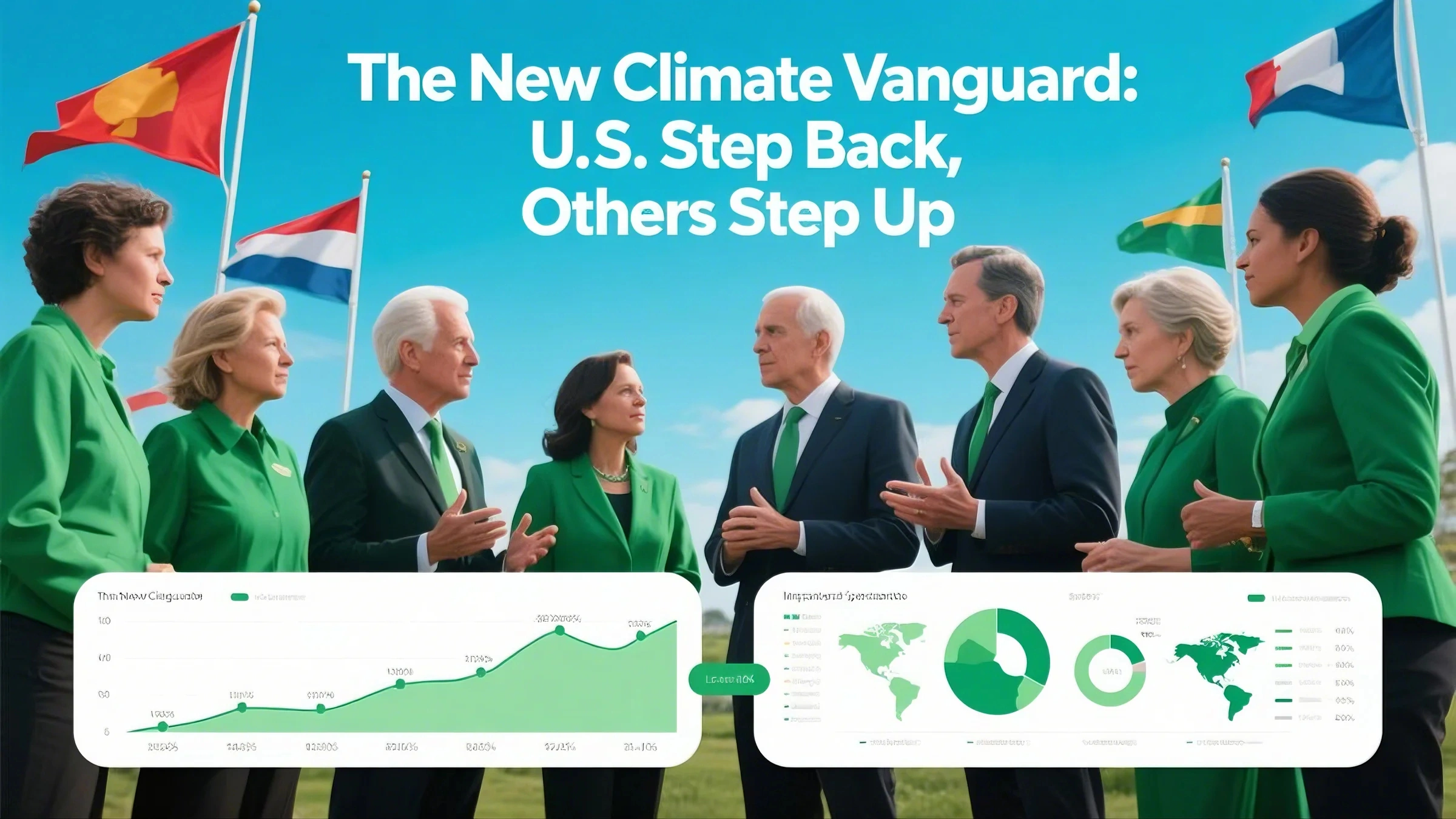The New Climate Vanguard: U.S. Step Back, Others Step Up

Early July 2025
In mid-July, President Trump signed the so-called One Big Beautiful Bill Act, effectively undoing main provisions of the Inflation Reduction Act phase-out of tax credits on wind and solar, and additional limitations on renewable projects. This is a sharp turnaround, as the U.S. turns against vigorous decarbonization as a new axis of climate leadership forms behind the EU, BRICS countries, and China.
The Reversal of the U.S. Policy: To Stall or not to Stall?
Ideas for Exile
According to the laws proposed by Trump, the country would stabilize its emissions that had been on a declining trend. Wind capacity is especially in store for severe limitations; it is possible that half of the solar installations may be eliminated as compared to potential trends in former policies. This backdown damages American credibility on climate negotiations and ensures low confidence among investors on renewables.
Fossil-Fueled Flicker of Hope
Interestingly, the bill did not remove and rather increased incentives to carbon capture. Whereas this acts as an indication of a certain commitment about climate emission reduction, it does likewise reflect a continuing dependence on fossil-fuel infrastructure, a strategy that is not necessarily in line with the direction pursued by international rivals.
EU: The Green Standard of Perseverance
Aggressive Sights and Technological Discipline
European Union reacted to U.S. retrenchment revealing a new 2040 emissions target which is to achieve a 90 percent reduction of greenhouse emissions compared with those of 1990. EU officials especially Commissioner Wopke Hoekstra have been pressuring China to stop coal and enhance climate rhetoric before COP30.
Projecting Leadership
In this instant, the EU is molding itself into the Financier of conscience of climate diplomacy. Brussels, with its solid commitment at home and championing abroad, is attempting to recoup the pullout of Washington influence-wise, with knowledge and money and alliances to keep it on the map.
BRICS & China: The Economical Giant Rampage
BRICS—Climate Bloc
In July, at the BRICS summit held in Rio, emerging economies and rising new players such as Indonesia made climate transition a priority and demanded developed countries provide both climate finance and structural support to decarbonization.
China: Factory of the future
China already enjoys the domination of the renewable manufacturing in the world- it possesses over 60 percent of the solar, wind, battery capacity. Beijing with its excess capacity and ambitions to export, are on the right track to entrench its power by creating a partnership with green tech but particularly in areas that had lost appreciation to the vagaries and capriciousness of western trade.
Geopolitical Implications: Multi Polar Turn
Change of Trade and Finance
With the U.S. declining, China and BRICS countries are strengthening a trading relationship and establishing alternate financial options. The fact that they are having a momentum in climate building serves as a boost of political leverage and diminishes their reliance on Western dominated institutions.
Climate Finance: A Tug-of-war around the world
BRICS countries are insisting on gaining a seat at the table when it comes to climate finance, including the reconstitute control over such instruments as the Global Environment Facility. Their unity implies the new multipolar negotiation dynamic that still has internal divergence characterized by states dependent on fossil fuels and greener economies.
Risks, Challenges and Ethical Questions
Separation or Unification?
A patchwork of global approach to climate solutions will leave the U.S. behind, and the only thing it has is carbon capture as such. Such division can also divide markets further and restrain coordinated action unless cured by later governments.
BRICS: Solidarity or Trading-Off?
This dominance and asymmetries within BRICS may cause the collectivity of their climate ambition to be strained by China. This division in their cancellation of the use of fossil fuel, their focus on economy, their role in the world government could water down the effect of the bloc.
Long-Term Trust and Co-operation
U.S. backing out of its former arrangements has the possibility of denting its image as a trustful actor. The bet today is whether the world governments will awaken again to take up daring climate initiatives– or stray into global irrelevancy.
Landmark Climate Impact
It was during this period that climate, as it is used to call it now, made a defining moment in the climatic aspect of influence. The trend in the second half of 2025 and the first months of 2026, with international events such as COP30, and BRICS own climate efforts, will determine the direction of the energy transition of the global economy. When the U.S. hesitates, the world will move further east and south. To the novelist, there is fruitful land lying here: a juncture of seismic events, of geopolitics and environmental imperiousness and an economic realignment that have all the trappings of storytelling.







